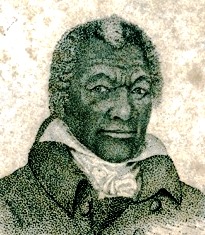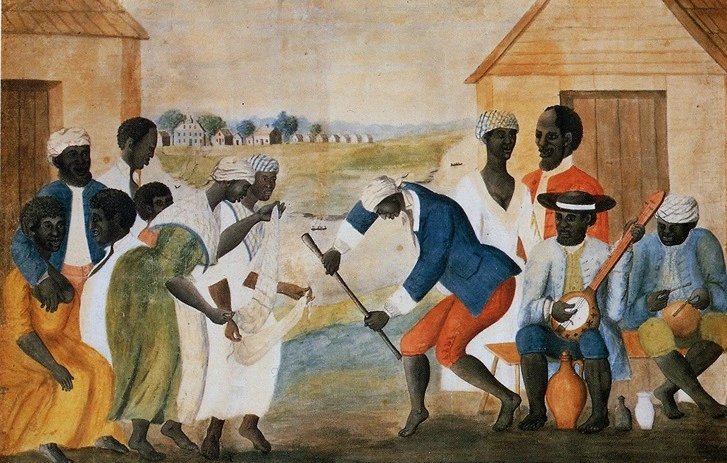Black Patriots
 A statue commemorating the African American patriots that fought at Valley Forge. Source: Wikimedia Commons.
A statue commemorating the African American patriots that fought at Valley Forge. Source: Wikimedia Commons.
By the time the American Revolution began, roughly half a million African Americans resided in the colonies with the majority of the African American population in 1775 being enslaved. While colonists protested slavery, their outcries remained unheard. At the start of the American Revolution, African Americans were barred from military service. Yet, severe shortages in manpower became evident in state militias, and eventually, the Continental Army drew among the African Americans enslaved population to serve. The 5,000 men who participated on the side of the Continental Army became known as Black Patriots. However, other African Americans who did not serve in an official capacity supported the war effort through different means.
Black Patriots:
African Americans who sided with the American colonies throughout the American Revolution
Did you know? African American soldiers were involved in almost every battle in the American Revolution! Though black soldiers in the Continental Army saw more action than those who fought for the Crown.
Famous African Americans in the American Revolution
Who were some of the famous African Americans involved in the American Revolution?
First Rhode Island Black Patriot Battalion:
 Watercolor painting representing the diversity of the soldiers fighting in America's war for independence, from left to right: a black soldier with the First Rhode Island Regiment, a New England militiaman, a rifleman, and a French officer. Source: Wikimedia Commons.
Watercolor painting representing the diversity of the soldiers fighting in America's war for independence, from left to right: a black soldier with the First Rhode Island Regiment, a New England militiaman, a rifleman, and a French officer. Source: Wikimedia Commons.
In 1778, the Rhode Island government issued a law allowing able-bodied enslaved people to enlist in the army. The state not only allowed African Americans to enlist but promised them complete freedom and provision of care if they became sick. As a result, white slaveholders strongly disagreed with this law. Scared they would lose a cheap source of labor, many slaveholders spread propaganda in an attempt to slow or stop black enlistment.
Over one hundred and thirty men enlisted in the regiment. Nevertheless, to help stem the slave owners' disdain for the law, Rhode Island purchased the enslaved people from slave owners prior to enlistment. Furthermore, extended enlistment periods and the acquisition of African American soldiers assisted in stemming the manpower shortages.
 Battle of Saratoga 1777. Source: Wikimedia Commons.
Battle of Saratoga 1777. Source: Wikimedia Commons.
Salem Poor
Enslaved on a Massachusetts farm in 1774, Salem Poor became eligible to purchase his freedom at the age of twenty-two. By the Revolutionary War, African American volunteers became acceptable to several militias. In 1775, Poor enlisted as a minuteman. He saw brutal battles in which he displayed heroic actions by aiding his fellow soldiers. Though Poor never received official recognition for his service, he continued to serve in the military until 1780.
Colonel Tye
Escaping enslavement, Colonel Tye became one of the most well-known fighters in the American Revolution. After escaping, Tye joined the British to fight against the American colonies. The British did not practice commissioning their African American soldiers. However, titles became customary for those who displayed unique talent. Tye immediately gained respect and a title within three years of entering the British forces. The British paid Tye well to raid Patriot homes, most of which had been former slave owners. Tye's reputation became so well known that even Patriots acknowledged his skill.
Phillis Wheatley

Portrait of Phillis Wheatley. Source: Wikimedia Commons.
In 1773, Phyllis Wheatley published her first book of poems, becoming the first enslaved African American to publish a book. Phyllis' enslavers realized her intellect and immediately began to educate her instead of forcing her into traditional duties as an enslaved person. In 1774, Wheatley's enslavers emancipated her, though with freedom came difficult circumstances. Difficulty plagued her as she attempted to secure funding for more publications. Finally, she married in 1778, but little is known about her life after the marriage. Wheatley often wrote in support of the colonies' independence and she argued strongly against the institution of slavery. The third colonial woman to have a work published, Wheatley consolidated her place in history. Many American colonists read her works, and her contribution to American literature is well known.
Wheatley's poem on tyranny and slavery in 1772 is an example of how she used her writing to convey her opinions:
Steel’d was that soul and by no misery mov’d
That from a father seiz’d his babe belov’d:
Such, such my case. And can I then but pray
Others may never feel tyrannic sway?
–Phillis Wheatley, Poem on Tyranny and Slavery, 1772
Black Loyalists:
While many African Americans fought for the Continental army, others chose the side of the Crown and were known as loyalists. It is estimated that 20,000 African Americans fought for the Crown. The British governor of Virginia, Lord Dunmore, offered freedom to escaped enslaved people who fought for the British. Like their counterparts in the Continental Army, black loyalists fought in hopes of securing freedom for their fellow enslaved people.
The British also offered land and other provisions to the black loyalists once the war was won. Roughly 100,000 enslaved people ended up with the British military, but the British left as the war turned in favor of the Americans. As the British departed, a number of African Americans were left behind and ended up back in slavery. However, another group of loyalists made it to Nova Scotia and New Brunswick.
African American Roles in the American Revolution
Here are some of the roles undertaken by African Americans at this time.
Seamen
African Americans took on various jobs and roles during the war to aid the war effort and escape slavery. While the American army lagged in enlisting African Americans, the navy "actively recruited African Americans, both free and enslaved, from the very beginning of the war."1 Therefore, Africans looking to participate took on the role of seamen. For example, enslaved people in Virginia found the Navy to be a safe escape from their enslavers. "In Virginia alone, as many as one hundred and fifty black men, many of them enslaved people, served in the state navy."2
After the war, the legislature granted several of these men their freedom as a reward for faithful service. White southerners disagreed with African American soldiers because of the chance to turn on their masters. Serving as a black patriot in the Navy posed less of a risk in the eyes of the South.
Foot Soldiers, Cooks, Artisans, Pilots

Portrait of James Armistead Lafayette 1784. Source: Wikimedia Commons.
Designated roles for African Americans in the military varied and were frequently labeled meager tasks. Africans also became boat pilots or accompanied battalions as cooks and artisans. However, as enlistment became a problem, colonies realized the necessity for enlisting African Americans as soldiers in the military or as spies, like James Armistead.
List of African Americans in the American Revolution
The names listed below are examples of African Americans and their roles in the American Revolution. (The list is not exhaustive.)
| Name: | Role: |
| James Armistead | Spy for the Continental Army |
| Crispus Attucks | Participated in the Boston Massacre |
| Oliver Cromwell | Soldier in the Continental Army |
| Colonel Tye | Solider in the Continental Army |
| Austin Dabney | Artilleryman for the Continental Army |
| William Flora | Soldier for the Continental Army |
| Lemuel Haynes | Minuteman in the local militia; Black Patriot |
| Agrippa Hull | Served as an orderly in the Continental Army |
| Boston King | Soldier for the British side |
| James Nickens | Seamen in the Virginia State Navy |
| Salem Poor | Soldier in the Continental Army |
| Joseph Ranger | Seamen in the Virginia State Navy |
| Caesar Tarrant | Naval Pilot for the Continental Army |
| Phillis Wheatley | First Published African American female poet |
Slavery in the American Revolution

The Old Plantation Painting 1785-1795. Source: Wikimedia Commons.
Slavery became a contested subject in particular areas in the colonies, though no significant actions were taken to end it. In 1775 Congress decided to deny African Americans entry into the colonial army due to its impact on southern slave owners. Forced to reverse its decision due to British promises of freedom, Congress allowed African Americans to enlist. As a result, many African Americans enlisted in the British and colonial armies and sharply impacted the war.
Revolutionary rhetoric fuelled a new generation of enslaved people who would bolster and create the antislavery movement in America. Freed African Americans created their own social structures in schools, communities, and churches. These structures lay the foundation for African American lobbyists who sought the complete eradication of slavery. While some African Americans successfully claimed freedom at the war's end, others received harsher outcomes.
The start of the abolitionist movement is rooted in the American Revolution. However, as the colonies became united, slavery was bolstered; the slave trade would continue for decades to come. The South, predominantly dependent on slavery, fought to keep the slave trade alive to maintain a cheap labor source.
Enlisted enslaved people, previously promised freedom for their wartime service were often forced back into slavery or killed. Due to the economic prosperity of the southern states, the slave trade became heavily entrenched in the area. Contradictory ideas in the Declaration of Independence helped spur the war to end slavery though it was not officially abolished until 1865.
Contradictory Ideology
In Thomas Jefferson's draft of the Declaration of Independence, he called for the end of the "abominable crime" of slavery. Yet, Jefferson, along with other founders, were slaveholders. While the Declaration called for "Life, Liberty, and the pursuit of Happiness," it did not extend these rights to African Americans. The lack of civil rights for all American citizens would continue to plague African Americans well into the twentieth century.
Black Americans in the American Revolution - Key Takeaways
- Americans fought for both sides in the American Revolution.
- 5,000 Black Patriots fought for the Continental Army.
- 20,000 Black Loyalists fought for the British Crown.
- African Americans had many roles in the American Revolution and not only among the military ranks, but they also play key roles as seamen, cooks, artisans, and pilots.
- Slavery in the American Revolution persisted as an institution.
- Slavery became further entrenched in the South after the war.
- Revolutionary Rhetoric fuelled a new generation of enslaved people who would create the foundation for the abolitionist movement.
1. American Battlefield Trust,
Peter Salem, 2022.
2. Edward Ayres, African Americans and the American Revolution, 2022.
3. American Battlefield Trust, Ten Facts: Black Patriots in the American Revolution, 2022.













